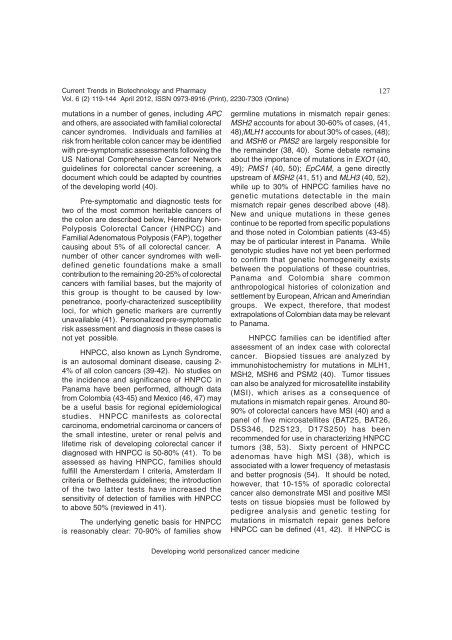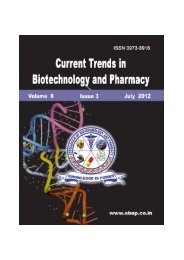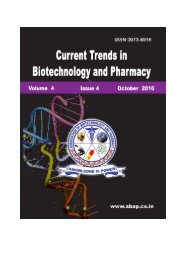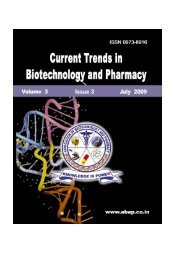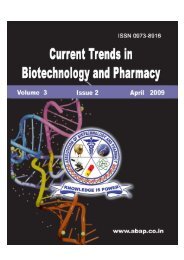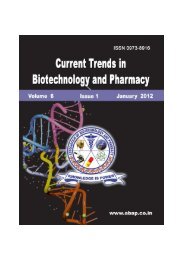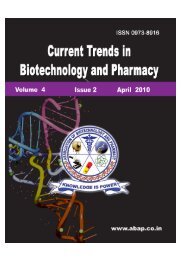d(GC) - Association of Biotechnology and Pharmacy
d(GC) - Association of Biotechnology and Pharmacy
d(GC) - Association of Biotechnology and Pharmacy
You also want an ePaper? Increase the reach of your titles
YUMPU automatically turns print PDFs into web optimized ePapers that Google loves.
Current Trends in <strong>Biotechnology</strong> <strong>and</strong> <strong>Pharmacy</strong><br />
Vol. 6 (2) 119-144 April 2012, ISSN 0973-8916 (Print), 2230-7303 (Online)<br />
mutations in a number <strong>of</strong> genes, including APC<br />
<strong>and</strong> others, are associated with familial colorectal<br />
cancer syndromes. Individuals <strong>and</strong> families at<br />
risk from heritable colon cancer may be identified<br />
with pre-symptomatic assessments following the<br />
US National Comprehensive Cancer Network<br />
guidelines for colorectal cancer screening, a<br />
document which could be adapted by countries<br />
<strong>of</strong> the developing world (40).<br />
Pre-symptomatic <strong>and</strong> diagnostic tests for<br />
two <strong>of</strong> the most common heritable cancers <strong>of</strong><br />
the colon are described below, Hereditary Non-<br />
Polyposis Colorectal Cancer (HNPCC) <strong>and</strong><br />
Familial Adenomatous Polyposis (FAP), together<br />
causing about 5% <strong>of</strong> all colorectal cancer. A<br />
number <strong>of</strong> other cancer syndromes with welldefined<br />
genetic foundations make a small<br />
contribution to the remaining 20-25% <strong>of</strong> colorectal<br />
cancers with familial bases, but the majority <strong>of</strong><br />
this group is thought to be caused by lowpenetrance,<br />
poorly-characterized susceptibility<br />
loci, for which genetic markers are currently<br />
unavailable (41). Personalized pre-symptomatic<br />
risk assessment <strong>and</strong> diagnosis in these cases is<br />
not yet possible.<br />
HNPCC, also known as Lynch Syndrome,<br />
is an autosomal dominant disease, causing 2-<br />
4% <strong>of</strong> all colon cancers (39-42). No studies on<br />
the incidence <strong>and</strong> significance <strong>of</strong> HNPCC in<br />
Panama have been performed, although data<br />
from Colombia (43-45) <strong>and</strong> Mexico (46, 47) may<br />
be a useful basis for regional epidemiological<br />
studies. HNPCC manifests as colorectal<br />
carcinoma, endometrial carcinoma or cancers <strong>of</strong><br />
the small intestine, ureter or renal pelvis <strong>and</strong><br />
lifetime risk <strong>of</strong> developing colorectal cancer if<br />
diagnosed with HNPCC is 50-80% (41). To be<br />
assessed as having HNPCC, families should<br />
fulfill the Amersterdam I criteria, Amsterdam II<br />
criteria or Bethesda guidelines; the introduction<br />
<strong>of</strong> the two latter tests have increased the<br />
sensitivity <strong>of</strong> detection <strong>of</strong> families with HNPCC<br />
to above 50% (reviewed in 41).<br />
The underlying genetic basis for HNPCC<br />
is reasonably clear: 70-90% <strong>of</strong> families show<br />
Developing world personalized cancer medicine<br />
127<br />
germline mutations in mismatch repair genes:<br />
MSH2 accounts for about 30-60% <strong>of</strong> cases, (41,<br />
48);MLH1 accounts for about 30% <strong>of</strong> cases, (48);<br />
<strong>and</strong> MSH6 or PMS2 are largely responsible for<br />
the remainder (38, 40). Some debate remains<br />
about the importance <strong>of</strong> mutations in EXO1 (40,<br />
49); PMS1 (40, 50); EpCAM, a gene directly<br />
upstream <strong>of</strong> MSH2 (41, 51) <strong>and</strong> MLH3 (40, 52),<br />
while up to 30% <strong>of</strong> HNPCC families have no<br />
genetic mutations detectable in the main<br />
mismatch repair genes described above (48).<br />
New <strong>and</strong> unique mutations in these genes<br />
continue to be reported from specific populations<br />
<strong>and</strong> those noted in Colombian patients (43-45)<br />
may be <strong>of</strong> particular interest in Panama. While<br />
genotypic studies have not yet been performed<br />
to confirm that genetic homogeneity exists<br />
between the populations <strong>of</strong> these countries,<br />
Panama <strong>and</strong> Colombia share common<br />
anthropological histories <strong>of</strong> colonization <strong>and</strong><br />
settlement by European, African <strong>and</strong> Amerindian<br />
groups. We expect, therefore, that modest<br />
extrapolations <strong>of</strong> Colombian data may be relevant<br />
to Panama.<br />
HNPCC families can be identified after<br />
assessment <strong>of</strong> an index case with colorectal<br />
cancer. Biopsied tissues are analyzed by<br />
immunohistochemistry for mutations in MLH1,<br />
MSH2, MSH6 <strong>and</strong> PSM2 (40). Tumor tissues<br />
can also be analyzed for microsatellite instability<br />
(MSI), which arises as a consequence <strong>of</strong><br />
mutations in mismatch repair genes. Around 80-<br />
90% <strong>of</strong> colorectal cancers have MSI (40) <strong>and</strong> a<br />
panel <strong>of</strong> five microsatellites (BAT25, BAT26,<br />
D5S346, D2S123, D17S250) has been<br />
recommended for use in characterizing HNPCC<br />
tumors (38, 53). Sixty percent <strong>of</strong> HNPCC<br />
adenomas have high MSI (38), which is<br />
associated with a lower frequency <strong>of</strong> metastasis<br />
<strong>and</strong> better prognosis (54). It should be noted,<br />
however, that 10-15% <strong>of</strong> sporadic colorectal<br />
cancer also demonstrate MSI <strong>and</strong> positive MSI<br />
tests on tissue biopsies must be followed by<br />
pedigree analysis <strong>and</strong> genetic testing for<br />
mutations in mismatch repair genes before<br />
HNPCC can be defined (41, 42). If HNPCC is


